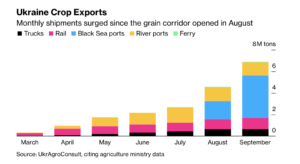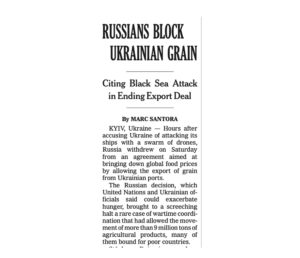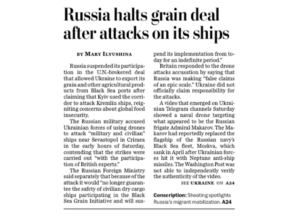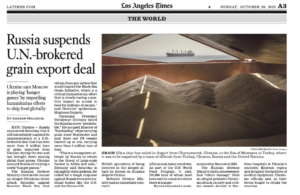A prolonged military conflict in the Middle East could potentially upend key commodity markets due to Iran’s control of the Strait of Hormuz, one of the world’s most important trade…
Russia Suspends Participation in Black Sea Export Deal
Financial Times writers Polina Ivanova, Christopher Miller and Emiko Terazono reported yesterday that, “Moscow has suspended its participation in a UN-backed deal with Kyiv that unblocked the movement of Ukrainian grain out of its southern ports, threatening to deepen the global food crisis.
“Russia linked its decision to pull out of the deal to an attack on Saturday on ships in the port of Sevastopol in the Crimean peninsula, which Russia annexed from Ukraine in 2014.
“It blamed the attack on Ukrainian armed forces, claiming air defences shot down Ukrainian drones but autonomous explosive boats had caused damage to navy vessels and energy facilities.”
‘In connection with the actions of the Ukrainian armed forces . . . the Russian side cannot guarantee the safety of civilian dry cargo ships participating in the Black Sea Initiative, and suspends its implementation from today for an indefinite period,’ the foreign ministry said.
The FT writers pointed out that, “Ukraine said Russia was using a false pretext for pulling out of the deal.
“‘We have warned of Russia’s plans to ruin the Black Sea Grain Initiative,’ Ukraine foreign minister Dmytro Kuleba said on Twitter.”
We have warned of Russia’s plans to ruin the Black Sea Grain Initiative. Now Moscow uses a false pretext to block the grain corridor which ensures food security for millions of people. I call on all states to demand Russia to stop its hunger games and recommit to its obligations.
— Dmytro Kuleba (@DmytroKuleba) October 29, 2022
Also yesterday, Bloomberg News reported that, “Russia pulled out of a deal to allow Ukrainian grain exports from Black Sea ports after drone strikes against its naval vessels, a move that threatens to exacerbate the global food crisis and send prices soaring again.
“‘It’s purely outrageous,’ US President Joe Biden told reporters in Delaware. ‘It’s going to increase starvation.'”

The Bloomberg article explained that, “To be sure, Ukraine is also exporting crops by land and river, but the safe-passage deal has been crucial in significantly increasing the flow of grain from one of the world’s most important producers. More than 9 million tons of goods have left Ukrainian Black Sea ports since the first vessel sailed Aug. 1.”
Marc Santora reported on the front page of today’s New York Times that, “Hours after accusing Ukraine of attacking its ships with a swarm of drones, Russia withdrew on Saturday from an agreement aimed at bringing down global food prices by allowing the export of grain from Ukrainian ports.
“The Russian decision, which United Nations and Ukrainian officials said could exacerbate hunger, brought to a screeching halt a rare case of wartime coordination that had allowed the movement of more than 9 million tons of agricultural products, many of them bound for poor countries.”

“Both Ukraine and Russia are struggling to find storage for bumper crops of grain, a problem that stopping exports would exacerbate,” the Times article said.
In an article on the front page of today’s Washington Post, Mary Ilyushina reported that, “Negotiations over an extension of the deal were strained even before the ship attacks, as Moscow has indicated it may back out of the deal after repeated complaints about its implementation.
“In September, Russian President Vladimir Putin floated the idea of limiting the deal, saying that the goods went to the European Union rather than to poor countries experiencing dire food shortages.”

The Post article noted that, “The head of the Ukrainian presidential administration, Andriy Yermak, said that Moscow was engaged in ‘blackmail’ using food products, energy, and nuclear materials, which he described as ‘primitive.'”
Ann M. Simmons, Jared Malsin and Isabel Coles reported yesterday at The Wall Street Journal Online that, “If shipments of Ukrainian grain are halted, the suspension will likely drive up the global price of wheat, corn and other vital food products.”
“Russia’s decision to suspend the grain deal is also a major blow to Ukraine’s globally important agriculture industry, which returned to a nearly prewar level of grain exports earlier this month, largely due to the deal,” the Journal article said.

Associated Press writer Andrew Meldrum reported in today’s Los Angeles Times that, “In Washington, U.S. Secretary of State Antony J. Blinken said the suspension was regrettable and urged ‘all parties to keep this essential, life-saving Initiative functioning.’
The Black Sea Grain Initiative has brought more than 9 million metric tons of food from Ukraine and lowered global food prices. We urge all parties to uphold this tremendously successful Initiative.
— Secretary Antony Blinken (@SecBlinken) October 30, 2022
“‘Any act by Russia to disrupt these critical grain exports is essentially a statement that people and families around the world should pay more for food or go hungry,’ Blinken said in a statement Saturday night. ‘In suspending this arrangement, Russia is again weaponizing food in the war it started, directly impacting low- and middle-income countries and global food prices, and exacerbating already dire humanitarian crises and food insecurity.'”
Reuters writer Guy Faulconbridge reported today that, “Russia’s ambassador to Washington scolded the United States on Sunday for making what he said were false assertions about Moscow’s decision to suspend its participation in a U.N.-brokered Black Sea grain deal.
“‘Washington’s reaction to the terrorist attack on the port of Sevastopol is truly outrageous,’ Ambassador Anatoly Antonov said on Telegram. ‘We have not seen any signs of condemnation of the reckless actions by the Kyiv regime.'”
Russia’s decision to suspend participation in the Black Sea deal puts at risks the main export route of much needed grain and fertilisers to address the global food crisis caused by its war against Ukraine.
— Josep Borrell Fontelles (@JosepBorrellF) October 30, 2022
The EU urges Russia to revert its decision.
Also today, Reuters writer Sabine Siebold reported that, “The European Union on Sunday called on Russia to reverse its decision to pull out of a U.N.-brokered deal that enabled Ukrainian grain exports via the Black Sea amid a global food crisis.”





